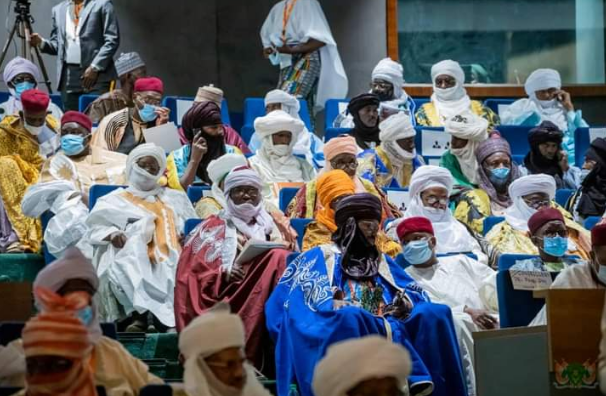Highly influential in their communities, traditional chiefs in the Sahelian country of Niger are key levers to lead the demographic transition as required by the United Nations Population Fund (UNFPA).
By special correspondent, Oumar Dembele
In the majestic Mahatma Gandhi Hall located in the Nigerien capital Niamey, Bety Aichatou Habibou Oumani proudly moderates a panel on child marriage, on Monday, November 22, in front of the traditional leaders of her country, adorning large boubous and other ornaments showing their ranks and titles.
A well-known activist for women’s rights, Mrs. Aichatou, also the president of the National Council for the Regulation of Post and Telecommunications (CNRTP) would not have been in this position some 40 years ago if her parents had not allowed her to escape “early marriage twice.”
But many young girls are not so lucky in Niger, where nearly eight out of ten marry before the age of 18, a rate of 77 percent.
As a result, they find themselves, for the most part, outside the education system, the country’s Head of State Mohamed Bazoum lamentd.
Bazoum had come to chair the International Symposium organized by UNFPA in Niamey, in an attempt to mobilize traditional leaders around the demographic transition issue.
“The demographic weight, it must be said, prevents us from strengthening the development of our human capital by ensuring access of our compatriots to social services (education, health …) and by facilitating access to decent employment for everyone. Taking this situation into account, I pointed out in my opening speech that our greatest challenge lies in the weaknesses of our education system, because the low enrolment rate and the high rate of school failures have the effect of depriving scores of children and young people of real educational opportunities,” says Mahamadou Issoufou’s successor.
Since Bazoum came to power last February, he had included among his main projects “the aim of turning our demographic assets into economic dividends.”
Strategy and actions
This is the meaning of this meeting initiated by UNFPA, which intends to accompany the new authorities of the country to “break the vicious circle of the excess number of uneducated children, which is an obstacle to development and economic growth.”
Niger is characterized by a population growth rate of more than 3 percent per year, a population half of which is under the age of 15 and which doubles every 18 years, Mr. Bazoum says.
To succeed in its mission, the UN Fund has relied since 2012 on a “strategic partnership” with the traditional chieftainship embodied by the Association of Traditional Leaders of Niger (ACTN), an age-old institution governed by texts.
In these reports, interventions in the chiefdoms or cantons have three specific objectives: to end child marriage, strengthen the enrollment and retention of girls in school, and support family planning and family welfare.
As an example, the chief of the southern district of Illela, Yacouba Hamidou Amadou, says he has overcome early marriage.
In his area, he notes that some parents took advantage of school vacations to marry their children off and shorten their studies.
Community leaders like him did not hesitate to cancel these marriages before sending the girls concerned back to their classes.
These efforts, among many others for democratic transition, were crowned in June 2017 in New York with the international United Population Awards, which ACTN received from Nigeria’s Amina J. Mohamed, Deputy Secretary-General of the United Nations.
The voice of Islam
But beyond traditional leaders, UNFPA Deputy Executive Director Dr. Diene Keita from Guinea says that religious leaders have a role to play in interpreting the texts because they are “the lantern that must shed light on women’s rights in Islam.
And according to Hamed Mohamed Abdelhamid, Imam of Al Azhar in Egypt, among many foreign guests,” child marriage contradicts Islamic law.
Prophetic Sunna forbids marrying young girls before their maturity and without their consent in the same way that “it is allowed to define a minimum age for marriage,” he adds.
The symposium, which closes on Tuesday, was marked by a lighthearted joke made by President Bazoum to the chiefs of cantons, calling on them to take a resolution by which they commit themselves “to the fact that no chief of canton, no sultan, no chief of a group takes as wife a girl under 18 years of age.”
This was seen as hilarious!
ODL/cgd/fss/as/APA


